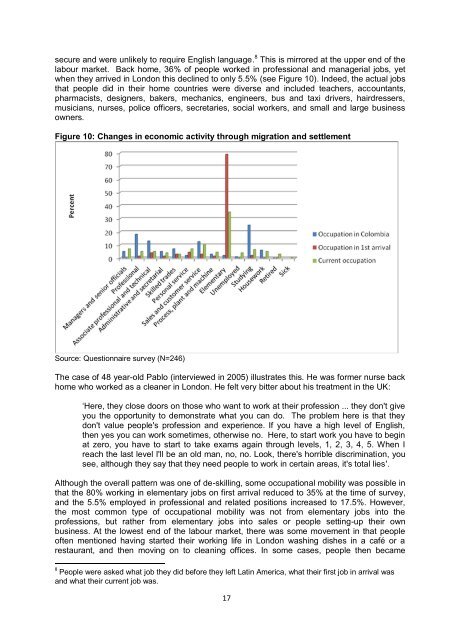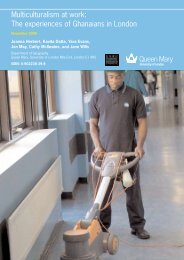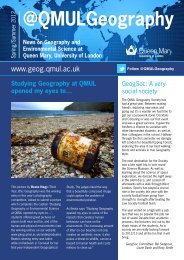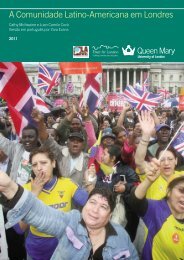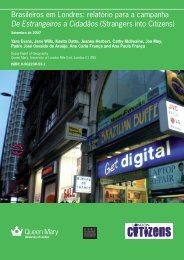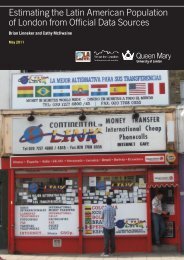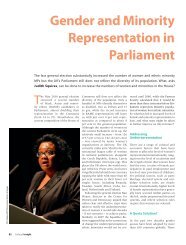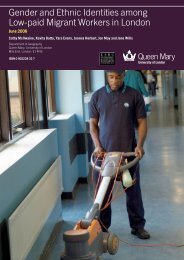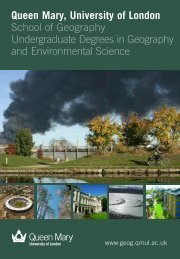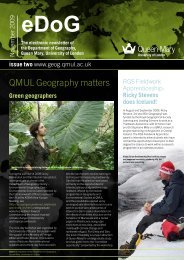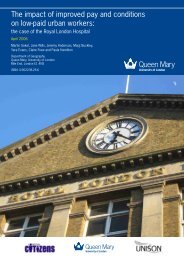The Colombian community in London - Geography - Queen Mary ...
The Colombian community in London - Geography - Queen Mary ...
The Colombian community in London - Geography - Queen Mary ...
- No tags were found...
Create successful ePaper yourself
Turn your PDF publications into a flip-book with our unique Google optimized e-Paper software.
secure and were unlikely to require English language. 8 This is mirrored at the upper end of the<br />
labour market. Back home, 36% of people worked <strong>in</strong> professional and managerial jobs, yet<br />
when they arrived <strong>in</strong> <strong>London</strong> this decl<strong>in</strong>ed to only 5.5% (see Figure 10). Indeed, the actual jobs<br />
that people did <strong>in</strong> their home countries were diverse and <strong>in</strong>cluded teachers, accountants,<br />
pharmacists, designers, bakers, mechanics, eng<strong>in</strong>eers, bus and taxi drivers, hairdressers,<br />
musicians, nurses, police officers, secretaries, social workers, and small and large bus<strong>in</strong>ess<br />
owners.<br />
Figure 10: Changes <strong>in</strong> economic activity through migration and settlement<br />
Source: Questionnaire survey (N=246)<br />
<strong>The</strong> case of 48 year-old Pablo (<strong>in</strong>terviewed <strong>in</strong> 2005) illustrates this. He was former nurse back<br />
home who worked as a cleaner <strong>in</strong> <strong>London</strong>. He felt very bitter about his treatment <strong>in</strong> the UK:<br />
„Here, they close doors on those who want to work at their profession ... they don't give<br />
you the opportunity to demonstrate what you can do. <strong>The</strong> problem here is that they<br />
don't value people's profession and experience. If you have a high level of English,<br />
then yes you can work sometimes, otherwise no. Here, to start work you have to beg<strong>in</strong><br />
at zero, you have to start to take exams aga<strong>in</strong> through levels, 1, 2, 3, 4, 5. When I<br />
reach the last level I'll be an old man, no, no. Look, there's horrible discrim<strong>in</strong>ation, you<br />
see, although they say that they need people to work <strong>in</strong> certa<strong>in</strong> areas, it's total lies'.<br />
Although the overall pattern was one of de-skill<strong>in</strong>g, some occupational mobility was possible <strong>in</strong><br />
that the 80% work<strong>in</strong>g <strong>in</strong> elementary jobs on first arrival reduced to 35% at the time of survey,<br />
and the 5.5% employed <strong>in</strong> professional and related positions <strong>in</strong>creased to 17.5%. However,<br />
the most common type of occupational mobility was not from elementary jobs <strong>in</strong>to the<br />
professions, but rather from elementary jobs <strong>in</strong>to sales or people sett<strong>in</strong>g-up their own<br />
bus<strong>in</strong>ess. At the lowest end of the labour market, there was some movement <strong>in</strong> that people<br />
often mentioned hav<strong>in</strong>g started their work<strong>in</strong>g life <strong>in</strong> <strong>London</strong> wash<strong>in</strong>g dishes <strong>in</strong> a café or a<br />
restaurant, and then mov<strong>in</strong>g on to clean<strong>in</strong>g offices. In some cases, people then became<br />
8 People were asked what job they did before they left Lat<strong>in</strong> America, what their first job <strong>in</strong> arrival was<br />
and what their current job was.<br />
17


